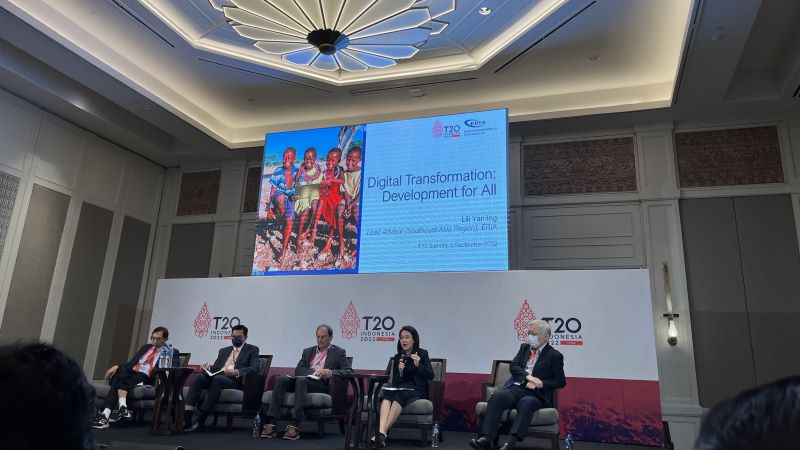T20 Summit: Leveraging Digital Transformation and Smartization to Improve Quality of Life
Date:
5 September 2022Category:
News, Press ReleasesTopics:
Digital Transformation, G20, T20Share Article:
Print Article:
Bali, 5 September 2022: The Economic Research Institute for ASEAN and East Asia (ERIA) co-hosted the Think20 (T20) Summit on 5 September 2022 at Hilton Bali Resort, Nusa Dua, Bali. Dr Lili Yan Ing, ERIA’s Lead Advisor for Southeast Asia Region participated in the T20 panel discussion session chaired by Prof Suhono Harso Supangkat, Task Force 2 Lead Co-Chair, themed ‘Leveraging Digital Transformation and Smartization to Improve Quality of Life’ along with Prof Dennis J. Snower, President of Global Solutions Initiative, Dr Mansi Kedia, Research Fellow at ICRIER, and Prof Toshio Obi, Co-Chair of Task Force 2 T20 Indonesia.
Dr Yayan Ganda Hayat Mulyana, Head of Secretariat of Foreign Policy Strategy Agency, Ministry of Foreign Affairs of Republic of Indonesia gave his keynote speech before the panel discussion. ‘An estimated 37% of the world’s population or 2.9 billion do not have internet access, of 2.9 billion offline an estimated 96% live in developing countries. There is urgency to reduce digital disparity, particularly for developing nations,’ Highlighted by Dr Mulyana. Dr Mulyana mentioned key messages: (1) it is important to develop local capacity to ensure the digital transformation; (2) improve the digital literacy in developing countries; (3) continuously put efforts on harmonizing global health protocol standards through an integrated digital health; (4) digital safety as digitalization carries automation risk and data privacy risk.
The panel session discussed how to increase the distribution of high-quality and affordable global internet access connectivity, digital literacy and skills, and technology adoption through digital transformation and smartization, as well as the creativity and collaboration of diverse individuals, governments, and the private sector to enhance the quality of life. The most important part in sustainable development is the quality of life as well as the goal of ICT development is to improve society’s welfare. However, challenges such as disparate incomes, low digital literacy, and geographical conditions creates ICT application, development, and global connectivity difficult.
On the panel session, Prof Dennis J. Snower highlighted the importance of reducing the digital divide and providing digital literacy protecting privacy and cybersecurity. Prof Snower mentioned that enhancing digital literacy goes beyond education and training. We also need to take into account that over the past decade, it is not only the digital divide grown but also the cybersecurity threats have grown. Prof Snower concluded with his remark about the quality of life through GDP where the digital age has managed to generate a reasonable amount of GDP. However, the GDP growth is still very unequally distributed, and it makes us blind to two important aspects of digital life that we inhabit, one is social solidarity, and the second is the societal of social creation is agency.
Dr Lili Yan Ing then continued the panel discussion by highlighting that digital transformation improved productivity and trade. Technological advances can work faster and in greater precision and accuracy. Industrial robots and AI can also help markets to function more efficiently that lead to improvisation of human welfare overall. ‘However, it is important to note that digital transformation also raises inequality in two ways, displacement effects and premature deindustrialization effects. On top of inequality issues, the world faces several challenges in digital transformation and digital trade: privacy, cybersecurity, competition, and digital divide,’ Highlighted by Dr Ing.
As policy recommendations, Dr Ing addressed four important dimensions of the challenges posed by DX that the G20 might seek to address during Indonesia’s presidency of the group: first, the G20 needs to implement what it has already committed to in the fields of industrial robots, automation, and AI; second, G20 members should cooperate to promote incentives for technological adoption by developing countries to reduce the adoption cost of industrial robots, automation, and AI for businesses and to make these technologies commercially viable; third, the G20 should improve the quality of key digital enablers for the adoption of industrial robots, automation and AI; and finally, Dr Ing emphasized ‘the work of implementing and adapting to the massive changes that go along with DX falls on human capital. The G20 should continue to promote efforts to improve preparedness for digital and AI technologies, both amongst the workforce and firms (especially MSMEs, women, and youth) to reduce the digital divide and to promote more inclusive digital participation.’ Therefore, it is crucial for the G20 to further facilitate partnership between the private and public sectors to raise the pool of funds that can be used to reduce digital gaps and improve digital skills worldwide to ensure ‘development for all’.
The discussion continued with remarks from Dr Mansi Kedia that focused on digital literacy. Dr Kedia highlighted that the common understanding of digital literacy is the ability to live, work and learn in a society where communication and access to information increasingly through digital technologies. But it also means knowing limitations of technology and understanding the dangers and precautions. One of the key challenges of digital literacy according to Dr Kedia is that most digital literacy programs fail to address women’s social and cultural challenges especially in developing countries. Thus, the G20 needs to identify common measurable indicators of digital literacy. ‘As technology involves, the skill requirement will change, then digital literacy indicators must be dynamic. The G20 also needs to adopt gender specific targets and monitor progress,’ according to Dr Kedia.
Finally, the last remark was given by Prof Toshio Obi. Prof Obi mentioned some policy recommendations to the T20 on the digital transformation: (1) it is important for the G20 to reduce regulatory problems; (2) countries need to promote meaningful digitalization through cross-sectional collaboration in digital innovation. It is also important to develop smart cities or digital government in this digital age; (3) we need to close the digital divide, particularly for MSMEs, in order to support them to improve quality of life.

.jpeg)
.jpeg)
.jpeg)







